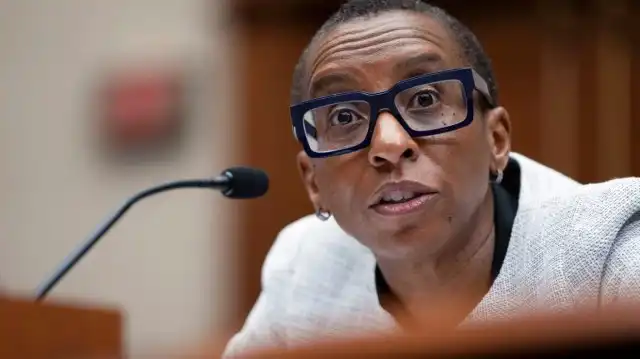Claudine Gay resigns: Timeline of Harvard's shortest presidential tenure
Harvard President Claudine Gay resigns amid multiple controversies, setting a record for the shortest-lived presidency at the storied university.
Harvard President Claudine Gay resigned on Tuesday amid multiple controversies, setting a record for the shortest-lived presidency at the storied university. She was appointed back in July and saw only a brief period of peace before October brought multiple controversies that eventually cost her the job, including accusations of plagiarism and the fallout from a disastrous House hearing on campus antisemitism.
"It is with a heavy heart but a deep love for Harvard that I write to share that I will be stepping down as president," Gay said in the statement. "This is not a decision I came to easily."
After discussing it with the school's governing board, the Harvard Corporation, Gay said, "it has become clear that it is in the best interests of Harvard for me to resign so that our community can navigate this moment of extraordinary challenge with a focus on the institution rather than any individual."
Here is a timeline of her short tenure:
Gay was appointed to be president of Harvard at the beginning of July, following Lawrence Bacow and becoming the 30 president of the institution. She was the first Black person to take charge of Harvard, the oldest university in the United States, and only the second woman to hold the position. Gay, 55, took the job after serving as Harvard's dean of the Faculty of Arts and Sciences.
Harvard became the first major school drowning in controversy in the wake of Hamas's attack against Israel on Oct. 7 after a letter signed by dozens of student organizations blamed Israel for the attack, which left more than 1,400 of its civilians dead. As anger fell upon the university, many Republicans and Democrats criticized Harvard's leadership for not stepping up to more forcefully condemn the letter and the attack on Israel.
While our students have the right to speak for themselves, no student group -- not even 30 student groups -- speaks for Harvard University or its leadership," Gay said in a letter on Oct. 10. That did little to quell the fury and accusations that Harvard and other universities were a breeding ground for antisemitism.
A moment that at the time flew under the radar came when The New York Post reached out to Harvard about allegations of plagiarism from Gay. While these concerns were not immediately of public attention due to antisemitism complaints, they did not subside for long. On Nov. 2, the Harvard Corporation put together an independent panel to investigate the plagiarism allegations. The antisemitism accusations against Harvard grew when the Office for Civil Rights of the U.S. Education Department announced an investigation into the issue.
The probe announcement came days before Gay would sit in front of Congress to discuss campus antisemitism. The beginning of Dec. is when things took a sharp turn for Gay when she and the presidents of the University of Pennsylvania (UPenn) and the Massachusetts Institute of Technology (MIT) sat in front of Congress for a hearing on campus antisemitism. The hearing made international news after all three presidents were asked by Rep. Elise Stefanik (R-N.Y.) if calling for the genocide of Jewish people would be considered harassment on their campuses.
Each president answered that it would depend on the context. While free speech experts said the answers were right legally, they were not taken well by the public. Lawmakers on both sides of the aisle and the White House all condemned the responses, and calls began to build for the three presidents to step down.
On December 7, the House announced a congressional investigation into all three schools, saying lawmakers would dive into the disciplinary policies and learning environments at the institutions. The next day, Gay apologized in an interview with the student newspaper, The Harvard Crimson, saying "calls for violence against our Jewish community -- threats to our Jewish students -- have no place at Harvard, and will never go unchallenged."
UPenn President Liz Magill resigned in the face of mounting criticism, including from many of her school's top donors and alumni. The Harvard Corporation released a statement addressing the backlash against Gay for the antisemitism hearing and touching on the plagiarism concerns that were raised.
"As members of the Harvard Corporation, we today reaffirm our support for President Gay's continued leadership of Harvard University," the board said. It announced in the statement the plagiarism allegations it received in October and the independent review begun of the papers in question. At this point, a petition with hundreds of signatures from Harvard faculty was signed in support of Gay.
Amid growing calls for Gay's resignation and investigations into her work by conservative outlets and activists, Harvard found more instances of plagiarism concerns that she needed to correct. The corrections were in her 1997 dissertation, which was not part of the initial review by the independent panel. "President Gay will update her dissertation correcting these instances of inadequate citation," the school said. Despite the actions by the school, the House announced the same day another investigation into Harvard due to the allegations, demanding communications about the plagiarism concerns and how the school would handle it if it was a faculty member or student.
In a tumultuous start to the new year for Harvard, Gay announces her resignation, bringing praise from many who have called for it for months.











Comments on Claudine Gay resigns: Timeline of Harvard's shortest presidential tenure